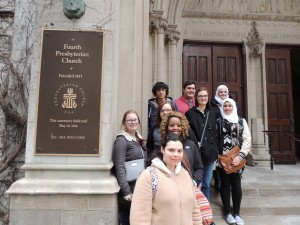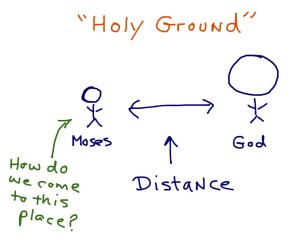What follows is the sermon I preached at the Golden Scots Alumni Memorial Service on June 11th, 2017 based on Acts 1: 1-14.
“The Coming and Going of God”
I have a great view of our commencement ceremony. I pray at the beginning and bless the graduates at the end and in between just sit there on stage as 250 names are called, observing the sea of humanity. It’s fascinating. Who needs Facebook with a view like this! Zealous mothers on cell phones knocking down the professional photographer to get their own photo; families holding up banners of congratulation and styrofoam-mounted photos of their graduate’s face; the unfortunate graduate in the front row who clearly pulled an all-nighter.
Graduation is such a moment, though. Crossing that stage to accept your diploma is like crossing a threshold. You step across and step out into your future, you step out on your own for perhaps the very first time. At the Baccalaureate Service the day before, we tell our graduates that as they go, they go with God. Which is true. But if we were being totally honest we would tell them that as they move into their future and move through their life God will come and God will go.
In our scripture passage for today from Acts we witness the disciples recalibrating as God comes and goes. First Jesus was there. Then he was dead. Then he appeared among them—meeting them on the road to Emmaus, cooking fish over a fire, allowing doubtful Thomas to touch the scars in his hands—until this passage in Acts where Jesus is lifted up on a cloud and taken out of sight. As Jesus floats away, two men in white robes appear to chastise the disciples saying, “Men of Galilee, why do you stand looking up to heaven?” as if they shouldn’t be surprised by what has just taken place. This coming and going, it seems, is par for the course with God. “Jesus, who has been taken from you,” the two men say, “will come in the same way as you saw him go.”
So it seems that in the life of faith there are times when God will be quite real to us—a physical presence that we can feel and know and commune intimately with. And other times, God will be gone, absent, leaving us longing for what we knew and felt before. There are seasons to the life of faith, seasons reflected by the church calendar; seasons of expectation and waiting, seasons of turning and returning, seasons of new birth and resurrection glory, seasons of epiphany, and seasons of ordinary time—when nothing special is happening and we are left to look for God among the daily, the routine, the mundane.
Although we don’t often say so, pastors experience all these seasons too. We know seasons when God is present and when God is not. In the midst of a bleak winter and a busy spring semester I found myself longing for a God whom I could not find. Lots of things factored into this spiritual dry spell. Mostly, though, it was a lack of focus on my part, or an inability to attend to God. I’d sit down to pray and ask God to be present with me in a way I could not doubt or explain away. And then my foot would fall asleep, or my mind would begin to write, or the laundry machine would beep, letting me know it was time to fold the clothes and put them away. For some reason, God didn’t care to show up when the laundry had to be done (and it has to be done all the time in our house.)
So I started to drive to the Quad Cities once a month to visit with a Benedictine nun, Sister Margaret, for spiritual conversation and prayer. Sister Margaret is probably in her late 70’s. She greets me with a warm smile at the door of her beautiful monastery, which is tucked away on a hill overlooking Rock Island. The drive alone to this beautiful spot fills me with a sense of peace and calm. So by my second or third visit with Sister Margaret I explained why I had come. I said to her, “I feel this longing for God.”
Sister Margaret sat across from me in a comfortable armchair as I shared this, her bible open on a small table next to her. She always has a scripture ready for me. But I needed to talk about this longing, this desire for God that I had been feeling, but not able to satisfy. I needed to confess and felt my apprehension reveal itself as I did.
Sister Margaret just smiled and nodded in response to me, as if my longing was good. But it didn’t feel good to me. It disturbed me. Why can’t I find God? I have in the past. So why not now? What’s different about me now? What am I doing wrong? Where has God gone? Or, was God ever there at all?
Sister Margaret just kept smiling and nodding. She approved. In fact, she applauded my longing as a form of prayer—like the Psalmist crying out, “Where are you God?” and then waiting for God to answer. She encouraged me to keep searching.
So I did. And as is typical for me, I found the best help in the pages of a book.
Christian Wiman is a poet who was diagnosed with a rare form of cancer when he was 37 years old. Before his diagnosis, he wasn’t really tuned in to church or to Christianity. But he was tuned in to something, he writes, a source of “negative energy” – or a sense of something missing and indefinable. After his diagnosis, his search for a more definable ‘something’ began and his book, My Bright Abyss: Meditation of a Modern Believer reflects all that surfaced as he searched. He begins the book with an unfinished poem:
My God my bright abyss
Into which all my longing will not go
Once more I come to the edge of all I know
And believing nothing believe in this:
I wonder how you might finish this poem? What would you say you believe at the edge of all you know? Where would God appear for you out of the bright abyss? Where might God appear for me?
After Jesus ascends, I find it interesting that the disciples seem to be chastised for the direction of their gaze. “Why are you looking up?” The angelic men ask, as if the disciples should be looking elsewhere for God. Maybe when God is absent we are simply looking in the wrong direction?
After the early horror of his cancer diagnosis, Wiman writes that the world returned sharper and starker. The dark energy of death pursued him, but it also enabled him to, in his words, hear the annihilating silence inside every sound and the nullifying stillness within every action. Life became so precious he attended to its every detail.
“Heading home from work,” he writes, “irritated by my busyness and the sense of wasted days, shouldering through the strangers who merge and flow together on Michigan Avenue, merge and flow in the mirrored facades, I flash past the rapt eyes and undecayed face of my grandmother, lit and lost at once. In a board meeting, bored to oblivion, I hear a pen scrape like a fingernail on a cell wall, watch the glasses sweat as if even water wanted out, when suddenly, at the center of the long table, light makes of a bell-shaped pitcher a bell that rings in no place on earth.”
Earlier, Wiman writes that “the very act of attention troubles the tyranny of the ordinary.” His words called me back to life, to the specificity of each moment. It felt as if, during my spiritually dry season, I had been trapped in the tyranny of the ordinary. But Wiman, like a good prophet, showed me the way back to life through the pen that scrapes like a fingernail on a cell wall and the glass that sweats as if even the water wants out. These details in the most boring of board meetings point to the vitality and the ‘moreness’ of life that is available to us if we are paying attention, if our eyes are not looking up but out at the world in which we live and move. God is not dormant in this poet’s world. God is not gone. Instead, God is everywhere—in every thing and every one.
When I was preparing to preach to you dear Golden Scots, I recalled conversations with my older church members who had started attending more services like these, with the names of the deceased printed on the back, and who, like Wiman, felt pursued by the dark energy of death. Friends and loved ones were passing away. They were saying goodbye too often. Death was a reality they were living with every day. It can be a difficult season of life. Or, I imagine, it can be the most precious if it enables us to lean into life, pay attention, and emulate the poets who can show us the sacred vitality of everything and everyone. Poets like Wiman and poets like Mary Oliver, who describes herself as one of God’s messengers. She writes:
My work is loving the world.
Here the sunflowers, there the hummingbird—
equal seekers of sweetness.
Here the quickening yeast; there the blue plums.
Here the clam deep in the speckled sand.Are my boots old? Is my coat torn?
Am I no longer young, and still not half-perfect? Let me
keep my mind on what matters,
which is my work,which is mostly standing still and learning to be
astonished.
Now to the God who is astonishingly present in every thing and every one, be all honor and glory, thanksgiving and power, now and forevermore. Amen.





